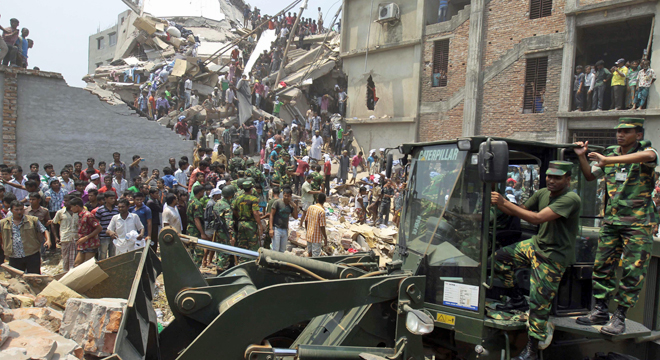PAMELA ENGEL | Business Insider
Early Wednesday, a factory in Bangladesh collapsed, killing at least 96 people and injuring more than 1,000.
A labor rights group official who has spent decades observing working conditions in Asia says cases like this are “really, really regular occurrences” in the country.
Timothy Ryan, Asia department director for the American Center for International Labor Solidarity, told Business Insider that the unsafe factory conditions in Bangladesh stem from an “institutional failure of the government … to regulate these factories.”
“This happens all the time,” he said. “As the infrastructure ages, you’re going to see more and more of this … it’s a chronic problem.”
Ryan said the factory owners built three additional floors on top of the five that were already existing. The foundation was not meant to support the extra weight.
Workers noticed cracks in the building on Tuesday but were forced to show up for work on Wednesday anyway.
“There’s a level of callousness and greed in this context,” Ryan said.
Big-name brands and retailers like Walmart, H&M, Sears and Gap have outsourced production of “billions of dollars of clothes” to Bangladesh as wages in China have led companies to search for lower costs, The New York Times reports.
Bangladesh has the lowest wages and labor standards of any country in the region, Ryan said.
The country’s garment industry has a minimum wage of about $37 a month, according to The Times.
“The choice by brand to pay the suppliers the lowest possible per-unit cost helps drive the process of moving from one low-wage country to another and then keep those wages lower in the countries they go to,” Ryan said.
After a November factory fire in Bangladesh that killed about 112 garment workers, Walmart and Sears said they didn’t know their clothes were being made there and blamed suppliers for subcontracting the jobs.
“They have said that they would look at their supply system, make improvements and do due diligence,” Ryan said. “We’ll have to look at that and see if they really are doing this or not.”
Please follow Business Insider on Twitter and Facebook.
Join the conversation about this story »
Business Insider is a new business site with deep financial, entertainment, green tech and digital industry verticals. The flagship vertical, Silicon Alley Insider, launched on July 19, 2007, led by DoubleClick founders Dwight Merriman and Kevin Ryan and former top-ranked Wall Street analyst Henry Blodget.











